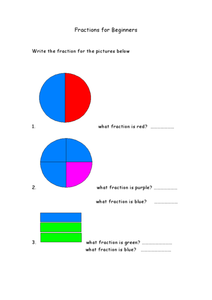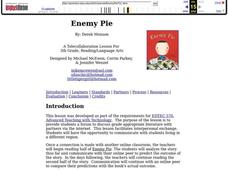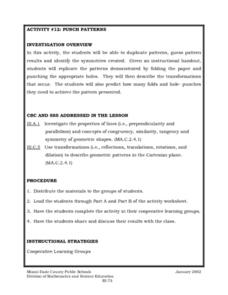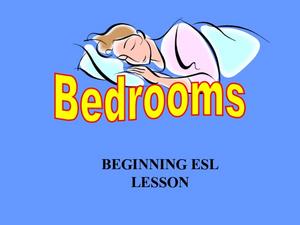Curated OER
Equivalent Fractions
Introduce elementary students, grades 3-5 to the concept of equivalent fractions. Each student folds a paper in half and color one of the equal parts of the paper. They use this paper to define numerator, denominator and the idea that a...
Curated OER
EZ Fractions
Pupils become familiar with fractions, and have a meaningful experience to relate them to. They write fractions, and identify numerators and denominators.
Math Worksheets Land
Partitioning Circles and Rectangles - Guided Lesson
Here are three shapes which have each been partitioned into parts. Learners label the part, whole, or fraction as directed. They label each as quarters or halves.
Curated OER
Fractions for Beginners
Review fractions with this colorful and motivating resource. Learners identify a fraction using a figure displayed in parts, answer word problems, and divide shapes into halves, quarters, and thirds.
Curated OER
Enemy Pie
Third graders pair up with a partner via an online classroom. They analyze half of the story "Enemy Pie" and communicate with their online peer to predict the outcome of the story.
Curated OER
Basic Needs of Living Things - Lesson One
An interesting way of teaching about basic needs of different organisms awaits your fourth graders. Pupils take part in class discussions and demonstrations which should lead to a greater understanding of how to determine basic needs. As...
Curated OER
Punch Patterns
Fifth graders duplicate patterns, guess pattern results and identify the symmetries created. They are given an instructional handout, 5th graders replicate the patterns demonstrated by folding the paper and punching the appropriate...
Wild BC
The Greenhouse Effect: The Role of CO2
Though this is meant to be second in a two-part lesson, the two are not dependent on each other. Pupils play the roles of visible light rays, light or dark surfaces, and carbon dioxide molecules. They interact and react according to...
North Carolina Standard Curriculum
Rhythm Counting
Understanding time signatures and rhythm counting are two very important parts of playing an instrument well. Here are three basic lessons rolled into one that prompt upper graders to play their instruments with care. They'll practice...
Curated OER
Discussing Poetry In Class
Students investigate syllabic metre and rhyming techniques by analyzing poetry. In this language arts lesson, students read the poem Considering the Snail and discuss the nature and mood of the poem with their classmates....
Tech Coach Corner
Understanding Sentences
Go over how to read complex sentences. Learners work on identifying key ideas, examining sentence structure, looking up new vocabulary, and paraphrasing. An overview of methods to help class members read difficult texts, half of the...
Teacher Web
Poetic Sound Devices
As part of a study of poetic devices, kids are asked to identify the assonance, consonance, and alliteration found in a series of lines of poetry, and then identify the rhyme scheme and the types of rhyme found in Poe's "Annabel Lee,"...
Curated OER
How We Are Alike And Different
Students engage in a lesson that is concerned with the similarities and differences as part of knowing other children. They use examples of different drinks to illustrate the differences or similarities that are present in the student...
Curated OER
Galaxies
The first thing to note is that this lesson was written for use in a parochial school. Even if you are in a non-religious setting, however, the website exploration of galaxies and the accompanying worksheet make for an engaging...
Curated OER
Bedrooms: Beginning ESL Lesson
"Lullaby, and good night..." Using this presentation, you can help English learners identify the basic items in their bedrooms. Blankets, cribs, nightgowns, and closets are all featured in these slides, along with cute pictures and brief...
Curated OER
My Conflict Shield
Eighth graders discuss conflict. Working in pairs, they create lists of skills they have used in conflicts, skills they have seen used successfully but not used themselves, and skills they wish to develop. From their lists they identify...
Curated OER
Fossils
In this earth science learning exercise, students use the clues given at the bottom of the sheet to solve the crossword puzzle on fossils. They identify specific names of fossils and how to make a mold of one.
Curated OER
Sentence Fragments
Tired of finding sentence fragments in your students' writing? Use this straightforward activity to help them identify when a sentence is not complete. Sixteen sentences prompt learners to rewrite fragments as parts of a complete...
Curated OER
Modeling Breathing Action
Students create a model to identify the parts of the human respiratory system. They explore the Functional Electrical Stimulation (FES) and its use as a breathing support strategy. Students explore reflex actions as an involuntary...
Curated OER
Cooking With Cuisinaires
Second graders explore fraction with Cuisenaire Rods. In this fraction instructional activity, 2nd graders recieve "recipe" cards for adding fractions. After practicing, students create their own cards then exchange with...
Curated OER
Fractions of a Sheet Cake
Second graders become familiar with the fractions in a whole. In this sheet cake lesson, 2nd graders view a Count on it clip about pumpkin pies. Students cut a sheet cake into eight parts and write as a fraction. ...
Curated OER
Thinking About Technology: What Is It? How Can It Help Us?
What is technology and how can it help us? Using a instructional activity, students read a list and choose practical applications of scientific knowledge, brainstorm examples of home, school and hospital technology, graph answers in a...
Curated OER
Count On It!
Young scholars investigate money. In this consumer math lesson, students use coins, identify their value, then group them in various ways to equal a dollar.
Curated OER
Comparing Fractions
Fifth graders differentiate between large and small fractions using drawings to represent the value. The lesson includes written dialogue for teachers tell students. The author recommends the use of fraction tiles for manipulatives.























